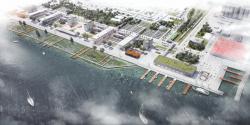It is estimated that by 2050 70% of the world population will live in cities. As citizens, we have made the urban fact more complex, a cost to ignore more and more the rural world, putting in crisis the system that historically we have adopted as binomials that cohesion on a daily basis, the one of field-city. It is evident the increase in agricultural productivity that occurs in distribution networks to enter the cities and reach the table, but also increases the economic costs that this requires, the loss of inherited knowledge, and the level of waste generated by the city that is expelled towards the outside.
The food port project investigates this relationship, seeks to rethink the associative principle on one of the first colonial cities traced in the territory of America, one of the first to suffer the oil shortage crisis, being forced to change its productive system , and to this day, its maritime front, the city of Havana, Cuba.
The proposal of new projects seeks to go out to reconquer the junk space, that obsolete border that gave origin to the port cities, generated by the economic changes that require reprojecting each of the fragments in which the city is articulated.
2017
0000
Local materials are used that allow its modulation and construction on the site as the possibility of being transported. Reinforced concrete, metal profiles, wood and obsolete port materials.
Gonzalo Nicolau





















